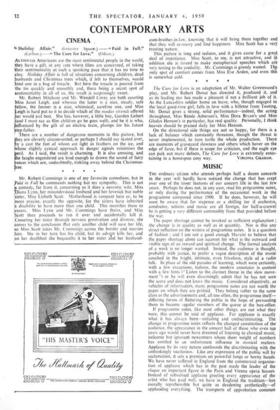CONTEMPORARY ARTS
CINEMA 44 Holiday Affair." (Leicester Square.) —" Paid in Full."
(Carlton.)—" The Cure for Love." (Odeon.)
ALTHOUGH Americans are the most sentimental people in the world, they have a gift, at any rate where films are concerned, of taking Their sentimentality at such a spanking pace that it has no time to cloy. Holiday Affair is full of situations concerning children, dead husbands and Christmas trees which, if left to themselves, would hind one in a bog of treacle. But here the treacle is poured from the tin quickly and smoothly and, there being a secret spot of sentimentality in all of us, the result is surprisingly sweet.
Mr. Robert Mitchum and Mr. Wendell Corey are both courting Miss Janet Leigh, and whereas the latter is a nice, steady, safe fellow, the former is a nice, whimsical, carefree one, and Miss .eigh is hard put to it to decide which of the modus vivendi offered er would suit best. She has, however, a little boy, Gorden Gebert (and I must say as film children go he goes well), and he it is who, uenced by the gift of an electric train, plumps for his future tep-father.
There are a number of dangerous moments in this picture, but they are cleverly circumvented, or perhaps I should say skated over, y a cast, the feet of whom are light as feathers on the ice, and hose slightly cynical approach to danger signals minimises the ril. As I said, the result is charming. It is also amusing, and he laughs engendered are loud enough to drown the sound of fairy oices which are, undoubtedly, tinkling away behind the Christmas- ee.
* * * * Mr. Robert Cummings is one of my favourite comedians, but in aid in Full he commands nothing but my sympathy. This is not comedy, far from it, concerning as it does a neurotic wife, Miss Tana Lynn, her misunderstood husband and her lovesick but noble !sister, Miss Lizbeth Scott. Motherhood is rampant here or, to be bore precise, exactly the opposite, for the sisters have inherited
disability to have more than one child. This mortifies them to excess. Miss Lynn and Mr. Cummings have theirs, and Miss Scott then proceeds to run it over and accidentally skill it. :Cosseting her sister through nervous prostration and divorce, she comes to the conclusion that only another child will save her life, So Miss Scott takes Mr. Cummings across the border and marries him. She in her turn has his child, but its advent kills her, and ion her deathbed she bequeaths it to her sister and her husband-
cum-brother-in-law, knowing that it will bring them together and that they will re-marry and find happiness. Miss Scott has a veil trusting nature.
This picture is long and tedious, and it gives cause for a great deal of impatience. Miss Scott, to me, is not attractive, and ift addition she is forced to make metaphorical speeches which are very testing to the credulity. Mr. Cummings is grossly wasted. Tkc"- only spot of comfort comes from Miss Eve Arden, and even this is somewhat cold.
* * The Cure for Love is an adaptation of Mr. Walter Greenwood's play, and Mr. Robert Donat has directed it, produced it, and as its leading star has made a pleasant if not a brilliant job of it. As the Lancashire soldier home on leave, who, though engaged to the local good-time girl, falls in love with a billetee from Tooting, Mr. Donat gives a strong, solid performance—indeed, the acting throughout, Miss Renee Asherson's, Miss Dora Bryan's and Miss Gladys Henson's in particular, has real quality. Personally, I think heaven should be praised daily for Miss Henson. On the directional side things are not so happy, for there is a lack of balance which constantly threatens, though the threat is never implemented, to turn turtle the whole production. There are moments of graveyard slowness and others which hover on the edge of farce, but if there is scope for criticism, and the eagle eye can pick out many defects, The Cure for Love is extremely enter- taining in a homespun cosy way. VIRGINIA GRAHAM.






































 Previous page
Previous page